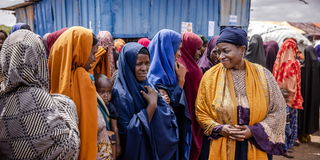In Somalia, hunger worsens women’s woes

UNFPA Executive Director Natalia Kanem speaks to a group of Somali women at Doolow camp for the displaced in Jubbaland State.
Somali women are carrying a double burden compared to their male compatriots as the drought bites the Horn of Africa country for a third year in a row.
And the danger of that, warned the head of the United Nations Population Fund (UNFPA), could be two steps back on a progress made in helping women access services such as safer deliveries and education on reproduction health.
At the end of her two-day trip to Somalia this week, UNFPA Executive Director Natalia Kanem said there should be urgent action to save lives of women and girls already suffering from the weight of drought in the country.
She described the situation in somalia as a “a catastrophe unfolding.”
“Entire communities are bearing the brunt of the worsening food crisis, but as is often the case women and girls are paying an unacceptably high price,” Dr Kanem said in a statement released on Friday after her trip.
Somalia, like neighbours Kenya and Ethiopia, is feeling the bite of drought continually since 2019, creating an emergency humanitarian situation as more than 20 million people are in urgent relief food across the Horn.
The drought is expected to continue into 2023, according to UN predictions.
But in Somalia, the story is worse for women. A majority of those displaced are women and children, data by th UN shows.
Nine in every ten girls, aged between 15-19 have undergone female genital mutilation (FGM) and more than a third of girls are married off before they turn 18.
The drought in the region has left more than 7.8 million people in need of urgent humanitarian assistance in Somalia and UNFPA says a majority of them are women.
UNFPA is the UN specialised agency for reproductve health services and often focuses on reducing maternal mortality, which in Somalia is among the highest rates in the world. It often does this by strengthening community midwifery and the supply of critical commodities, if budget allows.
In Somalia, she met with Somali Prime Minister Hamza Abdi Barre who said they had agreed to enhance areas of “collaboration between the government and UNFPA in empowering women and girls who are the key agents of development and change in Somalia.”
Traditionally, UNFPA in Somalia has been educating women on the dangers of female genital mutilation, early childhood marriages and the need to have safer deliveries and other critical reproductive health services. In the wake of drought, however, UNFPA, like other UN agencies, say they have run short on funds. They are appealing for $113.7 million for the UN Response Plan for the Horn of Africa Drought Crisis 2022-2023 to respond to women and girls escalating needs, a bulletin says.
In Somalia, she said hunger will kill people if the response is slow, but there could be other problems such as “dangers and rights violations, including rape and child marriage.”
She visited the Kabasa IDP camp in Doolow, Jubbaland state, and met women and girls who had trekked for long distances to reach the camp with their children. She warned food may be critical for eberyone but women will need other servics to ensure their reproductive health does nt lead to death.
“These services are the difference between life and death.”
Somalia’s drought has added to the existential security threat posed daily by al-Shabaab militants.
UNFPA data shows drought has resulted in more malnourished pregnant women, most of whom are already displaced in IDP camps. This, the agency warns, has raised risks of complications at birth.





